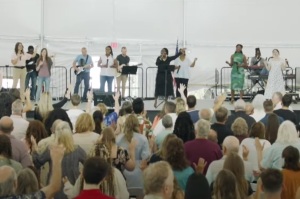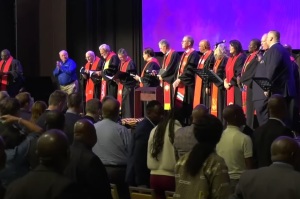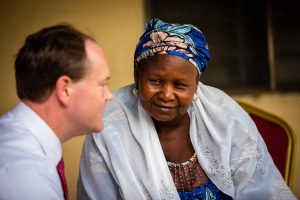Black Methodist School Presidents Say Discrimination Remains
Although the United Methodist Church has historically focused on ministering to the African American population, according to the presidents of some of the denomination’s Black colleges, the church is still far from understanding the mission of Afric
The United Methodist Church has historically focused on ministering to the African American population, providing education to freed slaves in the post-civil war era and playing a lead role in the civil rights movement. But according to the presidents of some of the denomination’s Black colleges, the church is still far from understanding the mission of African American ministry.
"There are many people who do not understand the mission of the church's historically black colleges and universities, which is to provide an affordable, education to deserving African-American students," Trudie K. Reed, president of Bethune-Cookman College in Daytona Beach, Fla., said last week according the United Methodist News Service.
During a Sept. 27 meeting in Nashville, Tenn., Reed, who also leads the Council of Presidents – the organization of presidents and former presidents of the denomination’s 11 historically black colleges – said black colleges are often misunderstood as recipients of mission when in fact they provide mission to the UMC.
"We are not only the recipients of mission, but our students go out to become the best citizens and engage in service learning, and many are called into ministry," UMNS reported Reed as saying. "We have a direct relationship to the mission and ministry of the United Methodist Church.
"We have seen a need to interpret our stories so that people know the value and benefit of black colleges," said the college president, whose Council oversees colleges that serve more than 15,000 students.
Black United Methodist colleges have provided opportunities for African Americans since the end of the Civil War. Through the academic institutions created by the UMC and its predecessor denominations in the South, freed slaves were able to receive the education they needed.
In 1972, this ministry expanded to the whole church with the establishment of the Black College Fund. The fund included black colleges in the regular support system of receiving apportionments instead of making them recipients of special appeals or offerings, according to UMNS. The fund helps support the programs and mission of the black churches, and each summer, student interns visit churches and annual conferences to promote the fund and to thank those who gave their apportionments.
But despite the 30 years of support, the presidents of those colleges said a sliver of discrimination still remain in the way people view the funds black colleges receive.
"It is not us asking the church to do something for us," said Elias Blake, former president of Clark College, the predecessor of Clark Atlanta University, according to UMNS. "The argument is whether the church is serious about finishing the mission it assigned to us."
The mission, Blake explained, is to bring about racial equality to the church.
"It is not a discretionary mission that we chose,” said the former college president. “This church assigned its racial mission to these institutions at the end of slavery, and these institutions carried that mission alone for 100 years. Only in the last 30 years have the rest of the United Methodist colleges shared in completing that mission within this church."
"These institutions redefined the racial equality mission of this church and set a strategy for binding up the wounds from the institutionalized division within the church," Blake continued. "Those wounds are in the process of healing, and these institutions have that burden still assigned to them."
On a positive note, the Council of Presidents learned during their meeting that the “Double Your Dollars for Scholars” program – the church’s matching program that provides $1,000 scholarships – will provide 316 scholarships for a total of $630,000 for the 2006-2007 academic year. They also learned that the program will be expanded to a “Triple Your Dollars” concept, in which students may be eligible for an additional $1,000 match and a total of $3,000 possible awards.





























